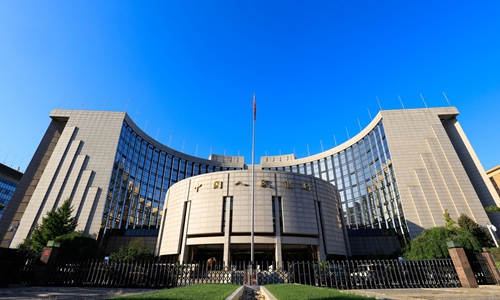China’s prudent policy easing VS the US’ unlimited QE: which one is better?
Source:Global Times Published: 2020/4/13 22:32:20

A view of the PBC's headquarters in Beijing Photo: cnsphoto
As countries and regions are rolling out both fiscal and monetary policies aiming to cope with the fallout of the novel coronavirus pandemic. China and the US have shown quite differences with the US launched unlimited quantitative easing (QE) which would be less effective than China's policy easing.In essential, the policies are either launched through central banks issuing money or through governments increasing debt, and the critical evaluate factor of the policies would be whether the increased debt could generate future income.
China's total social financing increased by 5.16 trillion yuan ($734 billion) in March, up 2.2 trillion yuan year-on-year, and financial institutions extended 2.85 trillion yuan in new loans, up 1.16 trillion yuan year-on-year. With both figures hitting record high, China is responding to the fallout of the pandemic with the loosest macro financing environment since 2016.
China's monetary policies came in three phases since the outbreak, with that in February focusing on bail-out rather than stimulating demand in a bid to stabilize cash flow and expectations. Policies in March entered an observation period for both evolvement of overseas epidemic and its impact on the domestic market, as well as China's early policies' effect. Later from the end of March, China enhanced countercyclical adjustments with focus on hedging against impact of the weak demand from both home and overseas.
Though China's monetary and fiscal policy is loose and active, it still remains moderate and restrained, which is different from both that of the US currently and that of China back in 2009.
By contrast, the US came up with an all-in plan including nearly zero interest rate, unlimited QE, $2 trillion fiscal stimulus package and an innovative $2.3 trillion lending plan. The US Fed entered the market to buy junk bonds for the first time to ease credit market risks, to offer loans for small businesses and families and to relieve unemployment pressure.
After rounds of stimulus, liquidity pressure in the US has been eased, especially in credit markets, households and small enterprises. But in the long run, excessive monetary stimulus increases economic and financial fragility, just like quenching thirst with poison.
The differences of the two nations' policies majorly because of three reasons. For starters, China contained the outbreak rapidly and its main task now is to resume production and expand demand, while the US has seen a massive outbreak due to its ignorance and late preparation.
Secondly, financial fragilities of the two countries are very different as the US has offered QE and extremely low interest rates since 2008, which has led to asset price bubbles, rising debt leverage, widening wealth gap and others. Meanwhile China has been lowering financial leverages in recent years and promoting the supply-side structural reforms, which have shored up China's financial security.
Thirdly, the two giant economies have different structures as the US majorly depends on consumption which accounted for 82 percent of its GDP in 2019. However, China has a more balanced structure with consumption accounted for 55 percent and investment accounted for 44 percent in its 2018 GDP, which paved the way for China's package of policies including moderate interest rate lowering, tax reduction, new infrastructure investments and consumptions stimulus plans.
Purely stimulate consumption will not generate capital, but lead to huge debt level. Only effective investment could generate capital and future incomes, and combining investments with consumption expanding could promote the economic growth into a virtuous circle.
No matter in short or long terms, it is obvious that stimulating investment, and matching it with expanding consumption is better than pure stimulus consumption.
The article was compiled based on an analysis written by Ren Zeping, chief economist for the Guangzhou-based Evergrande Group on Saturday. bizopinion@globaltimes.com.cn
Posted in: EXPERT ASSESSMENT